
Mike Illitch gets 60 percent public funds for new hockey stadium complex as Detroit goes through bankruptcy.
By Martin Z. Braun Sep 3, 2013
(VOD: Photos added by VOD. Also see VOD story at http://voiceofdetroit.net/2013/09/09/illitch-plans-881-million-red-wings-stadium-project-with-public-funds-despite-detroit-bankruptcy-filing/.)
At the 1997 groundbreaking for a 40,000-seat ballpark for Major League Baseball’s Detroit Tigers, Michigan Governor John Engler said the stadium would symbolize the city’s renewal.
Michigan Governor Rick Snyder approved a plan to put public money toward a $450 million downtown arena on behalf of the the National Hockey League’s Red Wings and their billionaire owners.
Ford Motor Co. (F) Chairman William Clay Ford Jr., whose family owns the National Football League’s Lions, said in 1999 that his new 65,000-seat dome would “showcase the city’s turnaround.”
Now that Detroit has become the biggest U.S. municipality to declare bankruptcy, it’s Republican Governor Rick Snyder’s turn to tout a comeback spurred by a stadium for a suburban fan base financed with help from city taxpayers. Snyder approved a plan to put public money toward a $450 million downtown arena on behalf of the the National Hockey League’s Red Wings and their billionaire owners.
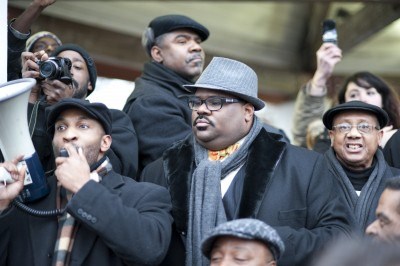
Rev. Charles Williams (in blue hat) and other pastors from Detroit and Benton Harbor during rally outside Gov. Rick Snyder’s residence MLK Day 2012.
The 18,000-seat complex and a planned $200 million private development nearby would transform a blighted area into one with apartments, offices, restaurants and shops, says Snyder, who controls the city through an appointed manager. Critics call the plan a giveaway to Mike Ilitch, owner of the Red Wings, the Tigers and the Little Caesar’s pizza chain.
“It’s going to be very tough, in my opinion, to make the case that the city of Detroit should go into bankruptcy so they can simply go in and just raid pensions or give money to the Red Wings,” said the Rev. Charles Williams II, senior pastor at Historic King Solomon Baptist Church in the city.
Hockeytown Agonistes
Detroit, a former auto-building powerhouse, on July 18 filed the largest U.S. municipal bankruptcy after years of decline. The city of about 700,000, which lost half its population in the past 50 years, has more than $18 billion in long-term debt and an operating deficit close to $400 million. Snyder’s emergency manager, Kevyn Orr, has proposed reducing pension and health-care benefits for employees and paying holders of $2 billion in unsecured bonds an average 18 cents on the dollar. The distress is so deep that 40 percent of the city’s streetlights have gone dark.
Yet six days after the Detroit’s filing, an arm of state’s economic development corporation gave preliminary approval to sell $450 million in tax-exempt bonds to finance a 650,000-square-foot facility to replace Joe Louis Arena, the home of the Red Wings since 1979.
‘Momentum Shift’
The Red Wings, one of the six original teams in the NHL, have won 11 Stanley Cup championships, the most of any franchise in the U.S. Hockey and the Red Wings are so popular in Detroit that fans, many of whom travel to games from across the region, refer to the city as Hockeytown, a coinage trademarked by the team.
Final approval for their new home is expected in November, said Michael Finney, president of the Michigan Economic Development Corp. The arena, which Finney said Detroit officials have approved, would be owned by a new public authority and leased by the Red Wings. Construction is to be finished in 2017.
Snyder said today that the arena would be “a huge momentum shift” for economic activity in the corridor between Detroit’s downtown and the Midtown district, which has experienced an influx of businesses and residents.
Catalyst Project
He said the new arena would tie in with nearby baseball and football stadiums. The corridor also is to get a new light-rail commuter train.
“It’s something that hopefully will be a tax-base generator,” Snyder said during a conference call with reporters. “Not the arena as much per se, but all the surrounding development.”
Construction would create 4,380 jobs and as much as $1.8 billion in new economic activity, according to Snyder and Olympia Development of Michigan, a company controlled by the Ilitch family.
John Hahn, a spokesman for Olympia Development, said the Ilitch organization has been committed to Detroit and the state for 31 years and was making another “substantial” investment downtown.
“We have a tremendous opportunity through this large-scale project to create jobs, stimulate economic activity and have a positive and lasting impact on our community,” he said in a prepared statement.
City and state officials point out that the public money that would partially back 30-year arena bonds had been previously targeted to economic development projects in downtown Detroit.
Meaningless Pursuit
Snyder, who has dubbed Michigan the Comeback State because of auto industry’s post-recession revival, may find that his projections collide with reality.
A 2002 study looking at whether construction jobs rose in St. Louis as a result of downtown arenas for the St. Louis Blues hockey team and Rams football team found they didn’t significantly affect construction employment.
Another study by economics professors Dennis Coates of the University of Maryland in Baltimore and Professor Brad Humphreys of the University of Alberta found that income per capita in metropolitan areas didn’t fall during player strikes, supporting an “emerging consensus” that professional sports don’t have an impact on local economies.
“There’s always a debate about does this really pan out?” Orr, the emergency manager, said in a July 25 interview. “The reality is we are so needy of some economic development, I can’t see how we don’t pursue it because if we don’t, what’s left?”
Tapping Schools
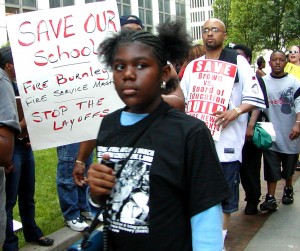
Detroit children have been protesting tidal wave of school closings, beginning with 50 in 2004, long before other cities were hit. More than half of the city’s schools are now closed. This photo shows protest July 1, 2004.
Almost 60 percent of the funds to pay for the arena would come from taxpayers. Bonds would be backed by a combination of about $15 million in annual payments from Detroit’s Downtown Development Authority and $11.5 million from Olympia. Wayne County may also provide support, according to a July 24 memo.
In December, Michigan’s legislature revived the ability of the development authority to take a portion of school-tax revenue generated by property on 615 downtown acres. The money, which had gone toward economic-development bonds, would be used for debt service on a project meeting the characteristics of a new Red Wings arena.
The levy generates about $13 million, said Bob Rossbach, a spokesman for the authority.
The money otherwise would have reverted to public schools and the state’s school-aid fund, according to a legislative analysis. The state will reimburse the district to make up shortfalls, just as did before 2011, said Rossbach.
“It’s not taking money from Detroit Public Schools and putting it into economic development,” Rossbach said.
Bipartisan Scorn
However, the state still must take money from programs to make up for cash benefiting the Iliches, said Shikha Dalmia, a senior analyst for the Los Angeles-based Reason Foundation, which describes itself as a public-policy think tank promoting free-market economics.
“The left should be crying bloody murder,” Dalmia said. “Why are you diverting money that’s meant for Detroit school children to this guy’s pocket? And the right should be crying about crony capitalism. They could easily have passed another state law which allowed this money to go to fighting crime, or a bazillion other things.”
From 2008 to 2012, the assessed value in Detroit’s downtown district declined by $167 million, according to the Detroit Downtown Development Authority’s 2012 annual report.
Chump Change
Andrew Zimbalist, an economist at Smith College in Northampton, Massachusetts, said that if — “and it’s a very big if” — a $200 million investment by Olympia to build around the arena comes to fruition, it might boost property values.
“The problem is often that the investment in the retail or the other activities are substituting for activity that’s being lost in the economy,” said Zimbalist, who has written 12 books on the business of sports. “Two hundred million dollars, by the way, isn’t a lot of money.”
Mike LaFaive a director at the Mackinac Center for Public Policy, a nonprofit research group in Midland, Michigan, that supports free markets, said the state shouldn’t dole out “corporate welfare.”
LaFaive, a Red Wings fan, said he was stunned by how quickly the legislation moved in Lansing and surprised that Snyder, who eliminated Michigan’s biggest economic development agency, would adopt a “state interventionist approach.”
“There’s a long history of politicians promising a renaissance, a comeback, a rebirth, basing their rhetoric of a construction of a heavily subsidized building in the city of Detroit,” said LaFaive. “And we’ve shown that it hasn’t worked.”
To contact the reporter on this story: Martin Z. Braun in New York at mbraun6@bloomberg.net
To contact the editor responsible for this story: Stephen Merelman at smerelman@bloomberg.net



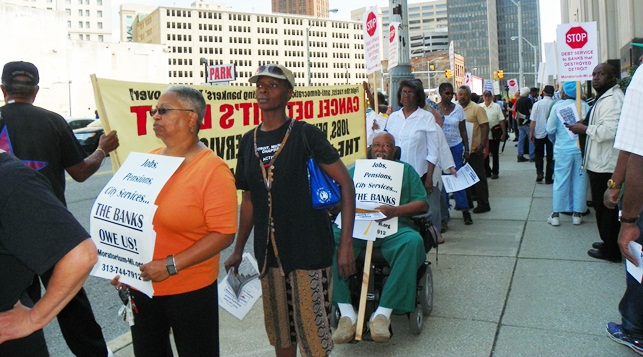
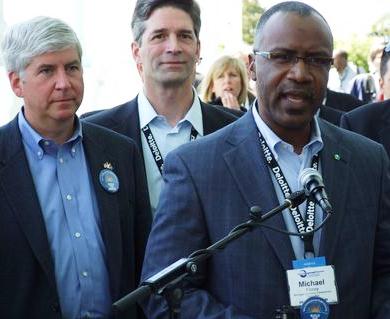
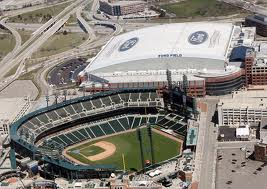
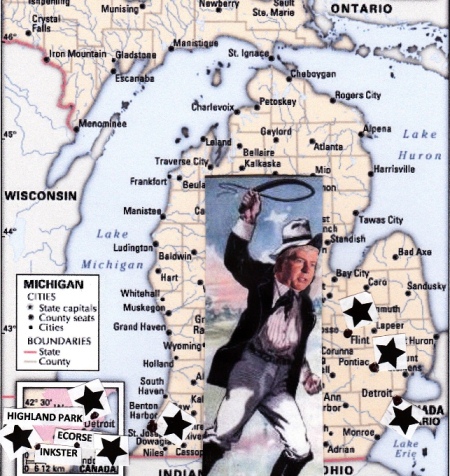




Interest rates are very low, why can’t they build their own stadium?
Red Bull stadium in Harrison NJ was financed by the Red Bulls, owned by the Red Bull energy drink people:
http://en.wikipedia.org/wiki/Red_Bull_Arena_(New_Jersey)